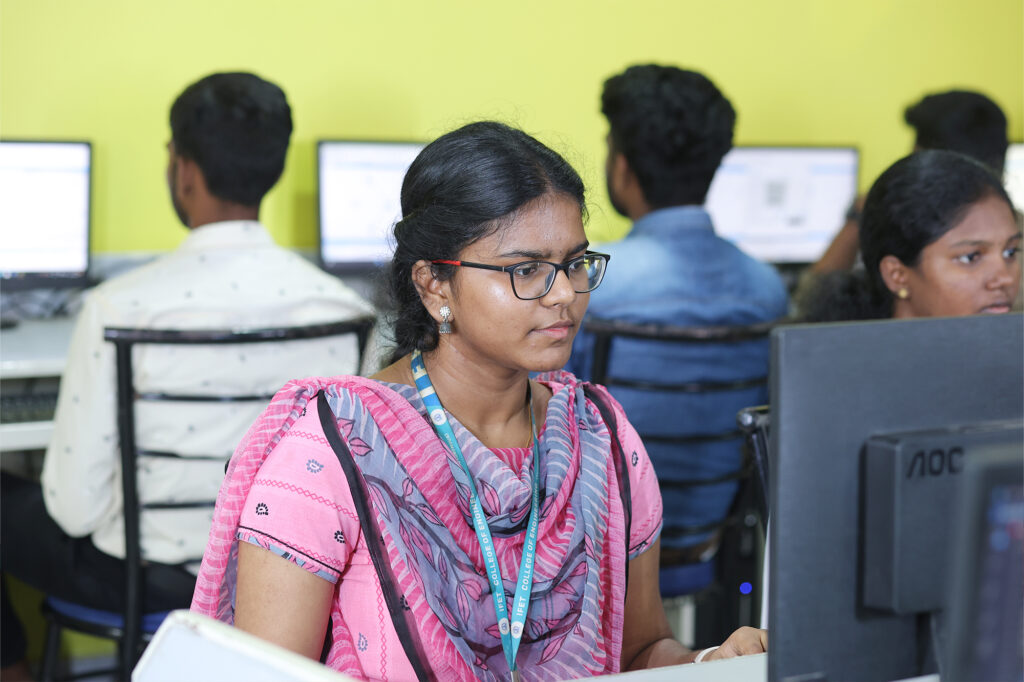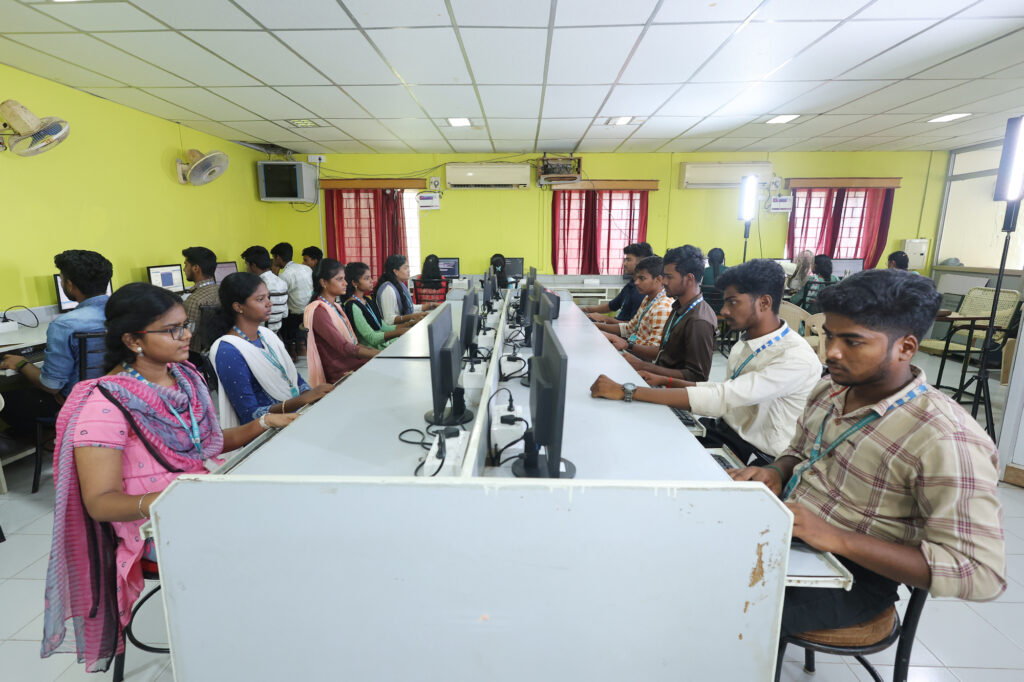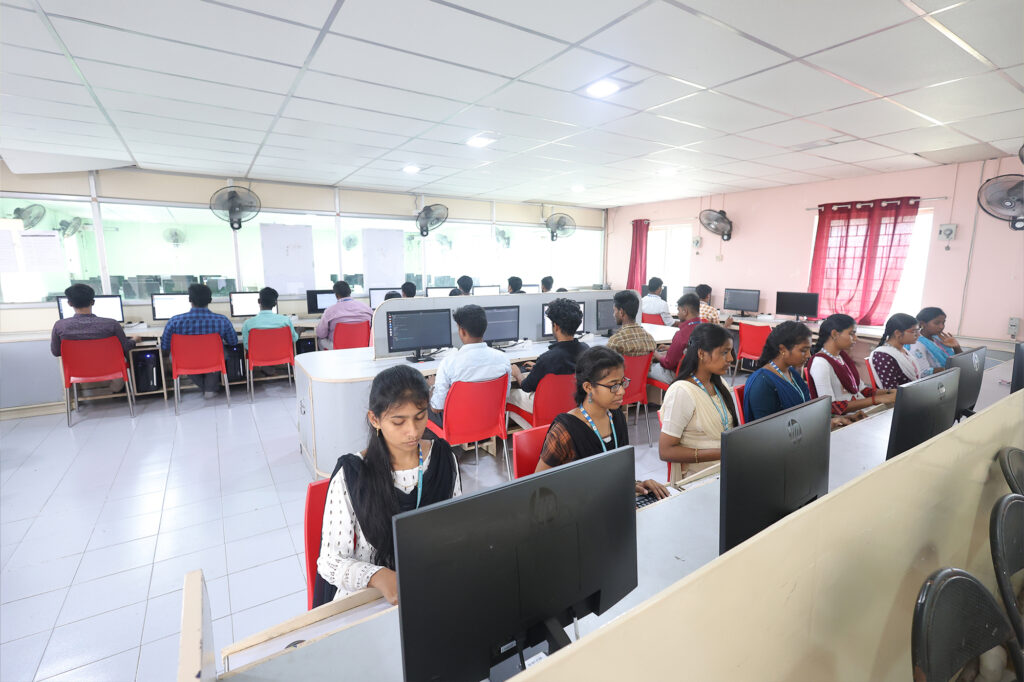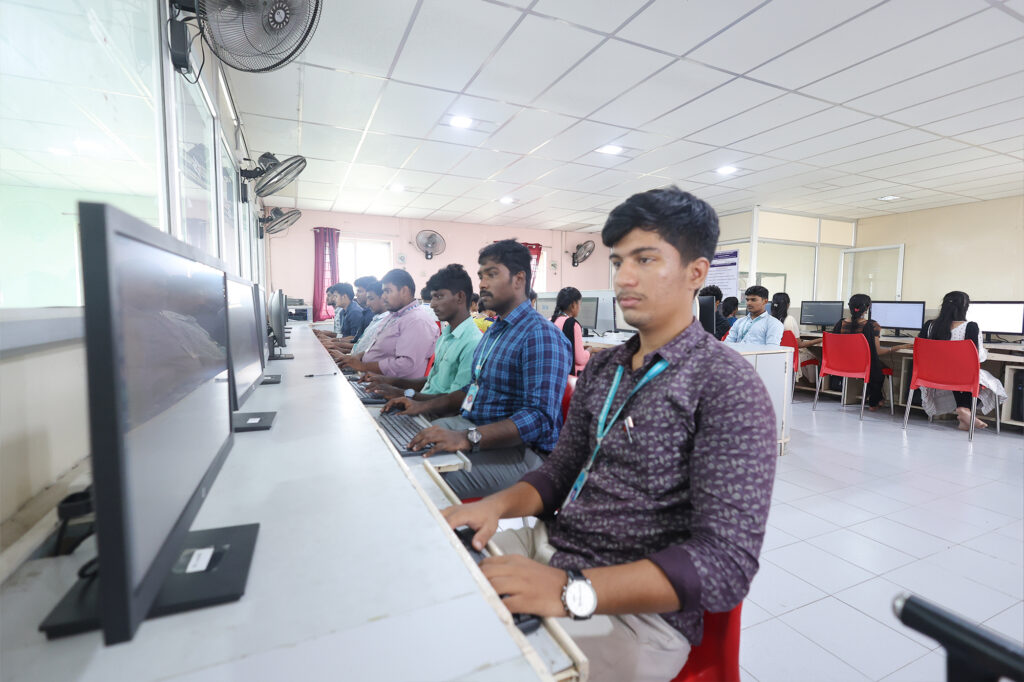Dr. S. Usharani and Mr. R. Parthiban (Associate Professors), along with Ms. D. Shanmugapriya, Mrs. P. Thulasi, and Mrs. M. Radhika (Assistant Professors) from the Department of AIML, successfully completed the 12-week NPTEL online certification course on “OBE and Accreditation” during July–October 2025.

Dr. S. Usharani
HoD (AI & ML)
The Department of Artificial Intelligence and Machine Learning (AI&ML) was established in 2021 with a B.Tech program aimed at providing students with a comprehensive understanding of this rapidly evolving field. AI&ML holds immense potential to accelerate global economic growth and reshape industries, creating a new relationship between man and machine. With increasing demand for AI-driven innovations, the department equips students with the skills needed to thrive in various job roles such as data analysts, machine learning engineers, data scientists, and AI engineers, all of which are highly sought after in today’s job market. The AI&ML program offers an innovative education driven by discovery and knowledge sharing. Under the guidance of a skilled and experienced faculty team, students are encouraged to think critically and develop solutions that address human, social, and economic challenges. The curriculum, crafted with input from esteemed academicians and industry experts, prepares students to excel in real-world applications of AI&ML across industries such as gaming, entertainment, social media, healthcare, robotics, banking, space exploration, agriculture, and more.
Click here to view Research Publication
Department Vision
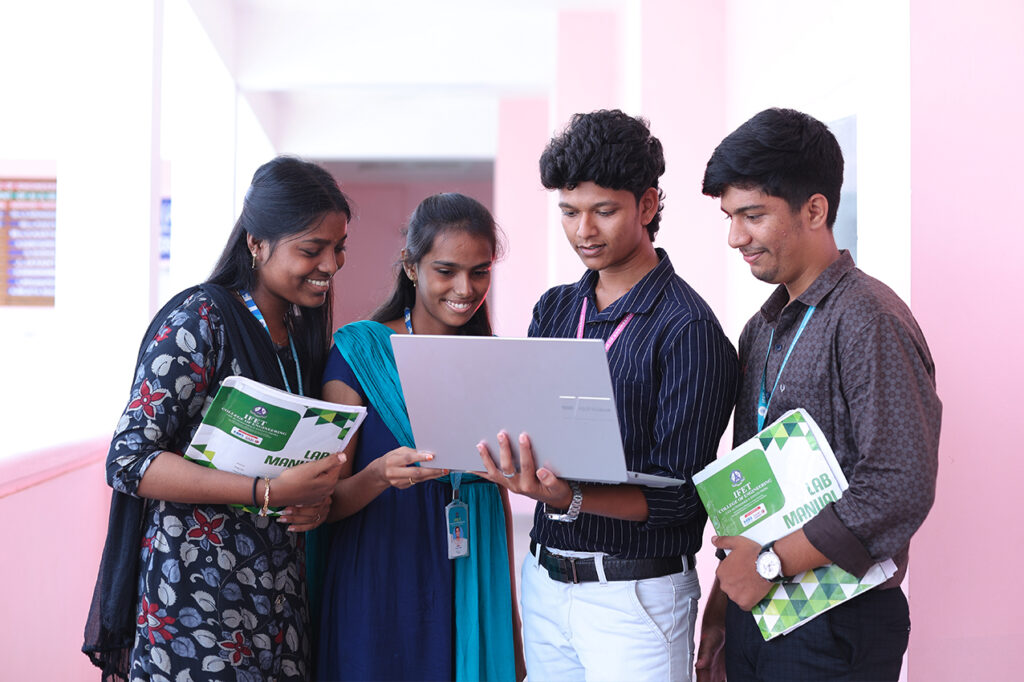
To be a top center for learning Artificial Intelligence and Machine Learning, guiding students to create a better future in technology and society.
Department Mission
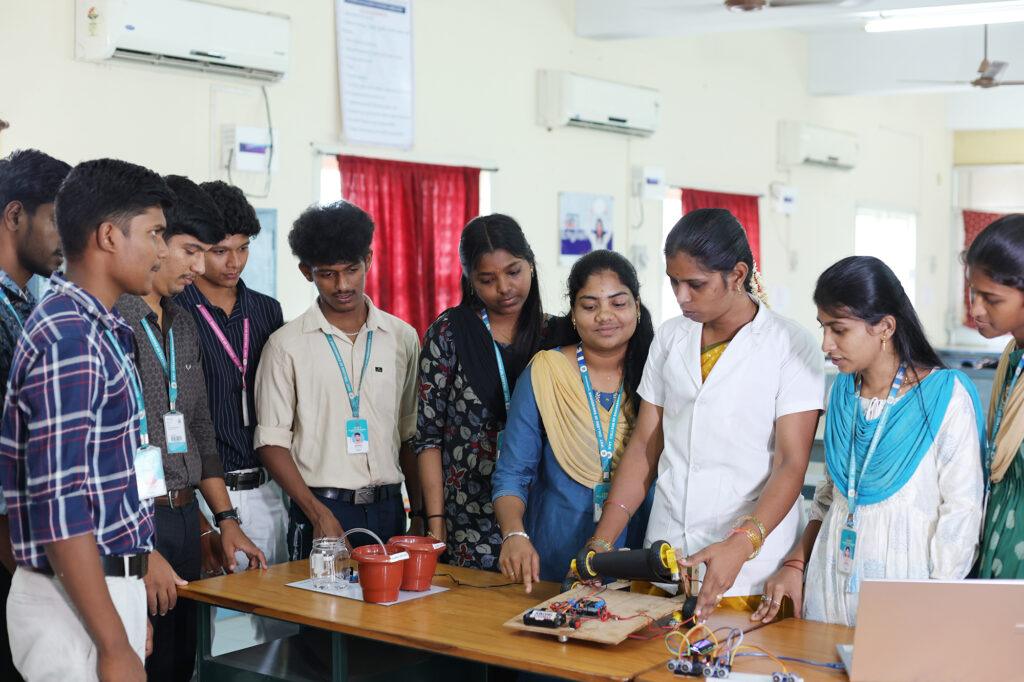
To build a strong foundation in Artificial Intelligence and Machine Learning by providing quality education and practical knowledge.
To empower students with ethical values and skills to make meaningful contributions to society through technology.
To encourage self-learning and leadership by guiding students to apply their knowledge to solve real-world problems.
To promote innovation and creativity, inspiring students to contribute to sustainable development and growth.
To prepare students for success in industry, research, and entrepreneurship at national and international levels.
E-magazine
2024 -2025
Department Activities
Publication – Book Chapters
Dr. S. Usharani, HoD & Associate Professor, Department of AIML, has successfully published a book chapter titled “Enhanced Privacy Preserving Deep Learning Using Blockchain and Federated Learning” in Blockchain and Federated Learning Synergy for Privacy-Focused DeepFex Solutions, Springer Nature Singapore, 2025.
05 Jan, 2026
Publication – Book Chapters
Dr. S. Usharani, HoD & Associate Professor, Department of AIML, has also published a book chapter titled “Advanced Privacy Measures for Data Sharing in Federated Learning Networks” in Blockchain and Federated Learning Synergy for Privacy-Focused DeepFex Solutions, Springer Nature Singapore, 2025.
05 Jan, 2026
NPTEL Certification
05 Jan, 2026
Session Chair
Dr. S. Usharani, HoD & Associate Professor, Department of AIML, successfully served as a Session Chair at the International Conference on Smart Technologies & Systems for Next Generation Computing, held at IFET College of Engineering on 20th and 21st November 2025.
05 Jan, 2026
Internship – UI/UX Design
Ms. Devika S, Student of III Year AIML, successfully completed a 30-day Internship in UI/UX Design at NoviTech R&D Private Limited from 3rd October to 3rd November 2025.
05 Jan, 2026
NPTEL Course Completion
Ms. Rangeetha M, Student of III Year AIML, successfully completed the 12-week NPTEL Online Certification Course on “Programming in Java” from July to October 2025.
05 Jan, 2026
Program Educational Objectives
PEO 1
Prepare graduates with a strong foundation in Artificial Intelligence and Machine Learning to design effective solutions for real-world challenges.
PEO 2
Develop graduates with ethical values and a commitment to creating sustainable and socially impactful AI/ML technologies.
PEO 3
Equip graduates with the skills to excel in industry, research, and entrepreneurship while fostering lifelong learning and global leadership qualities.
Program Outcomes
POs describe what students are expected to know or be able to do by the time of graduation from the program. At the time of their graduation, the B.E. Computer Science and Engineering students will have the following abilities.
PO 1. Engineering knowledge: Apply the knowledge of mathematics, science, engineering fundamentals, and an engineering specialization to the solution of complex engineering problems.
PO 2. Problem analysis: Identify, formulate, research literature, and analyse complex engineering problems reaching substantiated conclusions using first principles of mathematics, natural sciences, and engineering sciences.
PO 3. Design/development of solutions: Design solutions for complex engineering problems and design system components or processes that meet the specified needs with appropriate consideration for the public health and safety, and the cultural, societal, and environmental considerations.
PO 4. Conduct investigations of complex problems: Use research-based knowledge and research methods including design of experiments, analysis and interpretation of data, and synthesis of the information to provide valid conclusions.
PO 5. Modern tool usage: Create, select, and apply appropriate techniques, resources, and modern engineering and IT tools including prediction and modelling to complex engineering activities with an understanding of the limitations.
PO 6. The engineer and society: Apply reasoning informed by the contextual knowledge to assess societal, health, safety, legal and cultural issues and the consequent responsibilities relevant to the professional engineering practice.
PO 7. Environment and sustainability: Understand the impact of the professional engineering solutions in societal and environmental contexts, and demonstrate the knowledge of, and need for sustainable development.
PO 8. Ethics: Apply ethical principles and commit to professional ethics and responsibilities and norms of the engineering practice.
PO 9. Individual and teamwork: Function effectively as an individual, and as a member or leader in diverse teams, and in multidisciplinary settings
PO 10. Communication: Communicate effectively on complex engineering activities with the engineering community and with society at large, such as, being able to comprehend and write effective reports and design documentation, make effective presentations, and give and receive clear instructions.
PO 11. Project management and finance: Demonstrate knowledge and understanding of the engineering and management principles and apply these to one’s own work, as a member and leader in a team, to manage projects and in multidisciplinary environments.
PO 12. Life-long learning: Recognize the need for, and have the preparation and ability to engage in independent and life-long learning in the broadest context of technological change.
Program Specific Outcomes
POS 1
Apply theoretical and practical knowledge of Artificial Intelligence and Machine Learning to design innovative and interdisciplinary solutions for real-world challenges.
POS 2
Responsibly integrate ethical values and sustainable practices in the development of AI/ML technologies to address societal and environmental needs.
POS 3
Demonstrate leadership, self-learning, problem-solving, and teamwork skills to excel in industry, research, and entrepreneurial endeavors at global levels.
Laboratory
The AI and ML Lab at IFET College of Engineering is equipped with cutting-edge tools and technologies to facilitate hands-on learning and research in artificial intelligence and machine learning. Students explore real-world applications, from data analysis to algorithm development, with a focus on solving complex problems across industries such as healthcare, finance, and robotics. The lab fosters innovation, providing a platform for students to work on projects, and collaborate on industry-driven challenges, preparing them for successful careers in AI & ML.
Course Detail & Duration
Start your journey with a comprehensive 4-year B.Tech degree in Artificial Intelligence and
Machine Learning (AI & ML).
At IFET, we go beyond the standard curriculum by offering a B.Tech AI & ML with Honors,
giving you the flexibility to specialize in:
Business Analytics
Augmented Reality and Virtual Reality (AR/VR)
Throughout the program, you will gain hands-on experience and in-depth knowledge through
courses such as:
Artificial Intelligence
Foundations of Data Science
Machine Learning
Natural Language Processing
Deep Learning
Optimization Techniques
Cognitive Science
Soft Computing Techniques
AI &ML Highlights
AI & ML with Honors Degree
Comprehensive Curriculum
Experienced Faculty
Industry-Relevant Projects
Collaboration with Industry Leaders
Internship and Placement Assistance
Research and Industry Interactions
Global Exposure
AI &ML Scope
Graduates can explore opportunities in diverse sectors, including:
- IT Giants (Google, Amazon, etc.)
- Retail and E-Commerce
- Media & Entertainment
- Business Intelligence and Development
- Travel and Logistics
- Healthcare Industries
- Government Sectors
Salary
A Machine Learning Engineer in India can expect a competitive salary ranging from ₹6 lakhs
to ₹20 lakhs per year or more, with strong potential for growth as experience increases.
Job Profile
Graduates can pursue diverse and high-demand career paths, including:
- Data Scientist
- AI Engineer
- Business Intelligence Developer
- Big Data Engineer
- Data Analyst
- Machine Learning Engineer
- Research Scientist
Faculty List
| S. No. | Faculty Name | Designation | Degree |
|---|---|---|---|
01 | Dr. S. Usharani | Associate Professor | M.E., Ph.D |
02 | Mr. R. Parthiban | Associate Professor | M.E.(Ph.D) |
03 | Mrs. K. Vigneshwari | Assistant Professor | M.Tech. |
04 | Ms. D. Shanmugapriya | Assistant Professor | M.Tech. |
05 | Mr. N. Kumar | Assistant Professor | M.Tech. |
06 | Ms. S. Maduvanthi | Assistant Professor | M.Tech. |
07 | Mrs. S. Chanthini | Assistant Professor | M.E. |
08 | Mrs. P. Thulasi | Assistant Professor | M.E. |
09 | Mrs. M. Radhika | Assistant Professor | M.E. |

